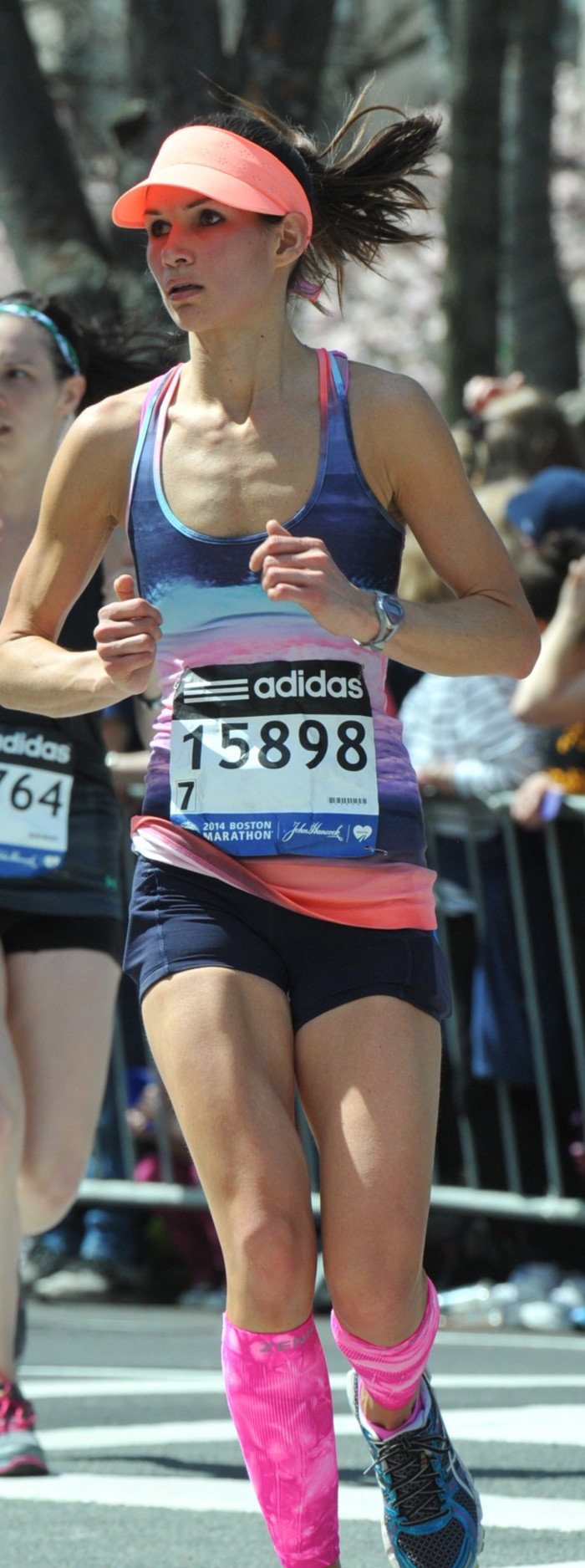I have to be honest with you. I have never “bonked.”
I’ve read about it, heard people describe it, and believe me I’ve felt all kinds of ridiculous pain around mile 20 of a marathon, but, I’ve never bonked or “hit the wall.”
While I can’t say for certain why I’ve avoided it, I do think my fasted morning runs haven’t hurt the issue. I have almost always run fasted in the early morning because it’s been convenient, I’m never hungry that early, and in the past I was always trying to avoid having GI issues on my run and less food equaled less chance of a problem for me.
In the beginning, I had no idea what glycogen was or that I had inadvertently been training myself for long distance success by running in a fasted state. All I knew was that I felt great on my runs and was perfectly fine to save breakfast until afterwards.
It wasn’t until I started reading about the science behind running that I realized I had been teaching my body to burn fat more readily over long distances and maintain my pace more easily.
What It Is
“Glycogen depletion training” is really simple: you don’t fuel, or you cut way down on fuel, before and during a longer run, with the purpose of training your body to use its own fat for fuel more easily.
If you’re training for a marathon, your long runs already have this as one of their goals, because anytime we run more than about 1.5 – 2 hours, we are going to have to use some of our fat for fuel. If your body is not used to this and can’t burn its own fat efficiently, you will inevitably slow down and possibly “hit the wall” or “bonk” right around 2 hours into your run. Or so the legend has it! Okay kidding, it’s not a legend. There is science behind why this happens.
When To Do It
Since your body can use stored glycogen for about 1.5 hours, it makes sense to do this type of run when you will be running about 2 hours or a bit longer. I do this type of long run earlier on in marathon training when my weekly long runs are 14-18 miles and I don’t need to practice my fueling strategy just yet. I have done this for 2 or 3 runs per training plan. I also only do this if the run will be at an easy pace (no marathon paced middle miles) since at faster paces our bodies will require more sugar.
And since the goal here is endurance over a long period of time, I believe it is only truly beneficial to do this type of training if you are preparing for a marathon or ultra, rather than shorter distances.
When Not To Do It
Don’t do this for speed work, tempo or marathon paced runs, or long runs near the peak of your training since at that point, fueling as you will on race day will be more important for your training than teaching your body to burn fat efficiently. If you have done some fasted runs earlier on in your training, your body should be pretty skilled at using fat by this point!
Why Do This?
You don’t have to train fasted to be successful in a marathon, but if you have had issues in the past with “bonking” it is probably a good idea to incorporate fasted training into your plan to improve your ability to use your own fat for fuel. It won’t make you faster, it won’t make you lose weight, it won’t make you a better runner with superpowers – BUT it will help your body learn how to turn its own fat into energy while maintaining a certain pace. So, even when you are fueling normally during your marathon your body will not “burn through” sugar as quickly since it will be using fat as well, and “saving” sugar for the times you need to kick.
How Do I Do it Without Starving?
First thing in the morning is the best time, because you haven’t used up much energy at that point just by being awake and you probably aren’t as hungry/tired as you would be later in the day. If it’s the first time you’re trying it, bring along fuel “just in case” or just start off with shorter runs to see how you feel. It’s not for everyone, and if it doesn’t feel right, there’s no reason you need to do it!
Consider This
- Hydrate as much as usual! Make sure you drink lots of water! No need to be dehydrated along with lacking fuel. Hydrate the night before and the morning of, and bring along water as you normally would.
-
You will need to plan your after-run refueling more carefully. Your body needs carbohydrates and calories to help it recover from a long run, and this is especially important if you completed your run in a fasted state. Make a carb-heavy smoothie (something simple like coconut water or almond milk with bananas) to have within 20-30 minutes of completing your run. Or if you’re lazy like me just shove bananas and coconut water directly into your face after your run. About an hour later, or sooner if you’re hungry, have a large meal consisting of carbs, fat, and some protein. You may feel a bit more tired after this type of run than others, so plan to rest accordingly.
-
Like I said earlier, THIS IS NOT ABOUT GETTING FASTER OR LOSING WEIGHT! It’s simply about the utilization of fuel. Here are links to some websites for further reading:
Have you tried glycogen depletion training? Have you ever “bonked” in a marathon? Are you happy with your current fueling strategy? What has been your experience running in a fasted state?








I have never really bonked and I do some runs fasting, but most of my early runs, I have a protein drink before going out the door. I can dig deeper when I’m fueled. I wanted to say in regards to a previous posting- tomato sauce + sweet potatoes = genius!!! I have never tried it and soooo glad I did;)
I came across the marinara and sweet potatoes by accident but it’s surprisingly good! Agree that the fueled long runs have an extra gear in them for sure, but I like to know I can get by without much since the marathon will deplete me more than any training run.
I’m generally cool with my current fuel strategy, but I know it could be better and I definitely need to revisit it during Dopey training. I totally bonked in my marathon at mile 22. I think that was mostly due to being somewhat under-trained (I had to pack a lot of miles into a short time due to a bout of tendonitis) because I was fueled pretty well through the whole thing. This is a great post and really interesting. I’m going to look into it more. 🙂
I think under-training definitely would make anyone more likely to hit the wall because getting those long runs in even with a solid amount of sugar for fuel is still training you to use fat. It’s nice to know you have a solid fueling strategy though that works, that’s a huge thing for long distance success!
Great tips! I am also fortunate enough that I never bonked or “hit that wall” during a race either. Well up until this point. I hope that it never happens, but you never know how your body will handle a race.
Very true that you just never know what will happen during a race! As prepared as you might be, the body can be a tricky thing and pretty sensitive especially when nerves are high race day. Hopefully it will never happen!
Oooh – I was waiting for this after your comment but didn’t expect it so soon! Awesome post, and so true!
I have only ‘bonked’ once – my first half-marathon, which I have written about. I didn’t taper, and I was still in the midst of weight loss so I didn’t fuel up at all, and held back on the Gu in order to not take more calories. Idiot.
Never again. 🙂
Yeah that combo sounds like a bad race recipe! For my first half I don’t even remember if I tapered, I think I might have just taken the day before off which worked well enough. I used to just have a banana before a race and then nothing until after, but now I like to mix bananas and gels on race day for extra backup. I still haven’t figured out my race day hydration, but that’s another story!
This is really interesting and im bookmarking this–thank you!! I do fasted runs all the time. There are times when I’m so hungry (near the end) and other times where it just helps me keep going and pushing harder bc my stomach isn’t upset by food/bowel movements,
Etc.
one thing I have noticed lately is that when I get up for a long run, I feel like I could head out the door RIGHT then and be fine. But of course, I’ll eat breakfast like a good girl and then wait for it to digest. Sometimes im more tired AFTER breakfast than before and I’m wondering if i should try a fasted long run?? Definitely some food for thought. And you’re right about the fact that it can make you more
Tired-sometimes running and then going to work exhausts me–lol it doesn’t help that I push it by not eating breakfast til I get to work–this helps the exhaustion!!! Perhaps I will start shoving more coconut water in my face right away bc that sounds delish!!! LOL
I know sometimes for my weekday runs I’ll get caught up in getting my kids ready and not eat anything until 8am when I ran at 5:30, I really prefer to refuel starting right away if I did a harder run. I wouldn’t do fasted long runs every time, but one or two might be a good idea if it feels okay for you. You can bring along fuel in case you really need it!
usually by mile 16 people are depleted on glycogen. But it totally depends on how they fueled the week before, ya know? I also know a lot who are keto adapted and can run on empty. To each their own
So true! I find the people who are keto adapted to be really interesting! I don’t think that’s for me, I am somewhere in the middle since I eat paleo but still include a decent amount of carbs. Psychologically I feel like I need extra carbs to back me up!
Great post, very informative. I have experienced the bonk. It was not pleasant. I admittedly need to get better at fueling.
We only improve after bad experiences! For the next time around you’ll have a better idea of how to train, fuel, and have a great race 🙂
I definitely bonk after about 2 hours of playing tennis! I like that there is someone else out there who also believes we aren’t exclusively carb OR fat burners… we can be both. We just need to teach our bodies.
Absolutely! Kind of amazing what the body can adapt to 🙂
I’m not a huge runner, and just got back up to 7 miles at a leisurely and comfortable 9:25 on my 65th birthday, as I work to get to doing a half in easily under 2 hours, but I MUST say, this thread has provided the singular source of the most useful information I have ever encountered. Thank you all.
I’m curious about how the upcoming Olympic qualifiers will unfold and which teams will secure their spots for Paris 2024.